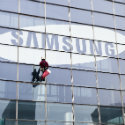
T-Mobile said it will use 5G equipment from Nokia and Ericsson in its three-year, $43 billion network-upgrade project stemming from the close of its merger with Sprint.
Samsung, though, doesn't appear to be participating in the effort.
"Samsung is proud to be an integral part of Sprint's LTE and 5G NR network and we look forward to extending that relationship with New T-Mobile," Samsung said in a statement to Light Reading when questioned whether it would supply equipment to T-Mobile. "For additional information, it is Samsung's policy to defer to the carriers to discuss their suppliers."
T-Mobile did not respond to repeated requests for information on the topic from Light Reading.
However, T-Mobile's incoming CEO Mike Sievert named only Ericsson and Nokia as T-Mobile's 5G vendors during an interview last week with CNBC.
"Our biggest suppliers are Ericsson and Nokia. And we're planning to expand our 5G network with our existing suppliers," Sievert said. "And with our existing suppliers, we have a synergy pool on the network side that we see line of sight to $26 billion in synergies. Just from the network side, $43 billion overall. So, this merger as we're planning it with our current partners is something that will unlock the potential of massive scale, finally positioning us at a scale comparable to AT&T and Verizon, but with obviously a culture and a brand and a value proposition that is so much more attractive."
T-Mobile awarded $3.5 billion each to Nokia and Ericsson in 2018 to construct its initial 5G network, which runs nationwide over its 600MHz spectrum and in seven cities in millimeter wave (mmWave) spectrum. However, T-Mobile is planning to dramatically expand and enhance that network via the 2.5GHz spectrum it is acquiring through its recently closed merger with Sprint.
Specifically, T-Mobile has promised to shutter 35,000 redundant cell towers around the country and build 10,000 new towers, leaving the combined company with 85,000 towers. Concurrently, the company plans to grow its small cell count from a combined 10,000 today to a total of 50,000 over the coming years. The company has promised that all that work will result in "the world's best 5G network" with average 5G speeds above 100 Mbit/s across 90% of the US population within the next six years.
It appears that the vast majority of that work will fall to Nokia and Ericsson, and not Samsung.
Samsung's absence from T-Mobile's new contract is noteworthy considering the vendor was one of Sprint's three main 5G suppliers. Sprint launched 5G in nine cities last year: Ericsson built Sprint's 5G networks in Dallas, Atlanta, Houston and Kansas City; Nokia built Sprint's networks in Los Angeles; New York City; Phoenix; and Washington, DC; and Samsung built Sprint's network in Chicago.
Moreover, both Verizon and AT&T selected Samsung alongside Nokia and Ericsson as a 5G vendor. The developments helped Samsung's networks business score significant gains. For example, analyst Stefan Pongratz from research and consulting firm Dell'Oro Group noted recently that Samsung's market share in North American mobile infrastructure grew roughly five percentage points between 2016 and 2018, with Samsung accounting for up to 10% of the market by the end of 2018.
Indeed, Samsung just a few months ago purchased TeleWorld Solutions (TWS), which is based in Chantilly, Virginia. The company provides the logistical and physical services – such as site acquisition and RF testing – involved in building wireless networks.
— Mike Dano, Editorial Director, 5G & Mobile Strategies, Light Reading | @mikeddano
About the Author(s)
You May Also Like











